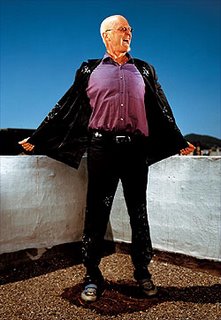 I saw that last week, and then was kicking myself for not remembering where it was so I could look it up and read more about it. Then I realized where it was: sitting on the back of my toilet at home in the most recent issue of Men's Journal. And yes, most men do their best thinking/reading in that room. They don't call it the "throne room" for nothing. I noticed it again last night as I was serving an eviction notice on some of my "resident evil." But that's another story for another day...
I saw that last week, and then was kicking myself for not remembering where it was so I could look it up and read more about it. Then I realized where it was: sitting on the back of my toilet at home in the most recent issue of Men's Journal. And yes, most men do their best thinking/reading in that room. They don't call it the "throne room" for nothing. I noticed it again last night as I was serving an eviction notice on some of my "resident evil." But that's another story for another day... It seems that the veritible inventor of the mountain-biking phenomenon in the early 80's, Gary Fisher, has been hanging out in Holland, studying the reasons for this disparity. His conclusions are many, but the bottom line is that gas at $3.00 per gallon here in the US is not nearly painful enough for us lazy bastards to change our habits.
It seems that the veritible inventor of the mountain-biking phenomenon in the early 80's, Gary Fisher, has been hanging out in Holland, studying the reasons for this disparity. His conclusions are many, but the bottom line is that gas at $3.00 per gallon here in the US is not nearly painful enough for us lazy bastards to change our habits.I saw a dude riding a Gary Fisher bike the other day - it was just a basic bike, no shocks, no nothin special, and noted that the guy riding it probably paid a pretty penny for it back in the day, and further, that it is probably worth a large bundle today - Gary Fisher sold his bike company to Trek a long time ago, and his original bikes are not all over the place today. Fisher still has a bike company, but it's now a relatively small player in the overall marketplace.
Anyway, back to my point. Fisher noted that Holland in particular underwent a transformation some time ago, because its citizens were not coping well with "benzine" prices, and instead of finding a way to make/buy it cheaper, the government went the other route, and instead implimented an agressive program to make the cities more bike-friendly, and the people have embraced the "new normal." Essentially, they looked at the big oil companies, and said, "F.O.A.D." (Holland has gained a bit of a reputation for this - they said the same thing to any and all illegal immigrants to their country a while ago, rounding them up and driving them back to the border, and kicking them off the (proverbial) bus.)
From this, two things are brutally obvious:
1. Our gas prices here in the US are not yet painful enough for us as consumers to be motivated to do anything besides what we've been doing for the last 40 years: putting more, bigger cars on the roads every year.
2. Our government is too intertwined with Big Automakers to be able to embrace an alternative transportation solution from a legislative/infrastructure standpoint here. There's too much money at stake. Lobby money is too attractive, elections are too easily purchased.
So let's get on the phone to our legislators this week and ask them to release more oil reserves and get our gas prices down again..... because that's the answer for sure.
I'm just sayin'.
2 comments:
Actually, studies show that gas prices have only temporary impact on transportation choices. People tend to cut back on oil-based transportation when prices jump, but travel patterns soon return to what they were before the jump. People will cut back on other things before they cut back on oil-based transportation.
The only thing that has been consistently shown to cause a change in transportation behavior is congestion and inconvenience. When alternative forms of transit become more convenient than conventional forms, people shift to the more convenient alternative forms. But the pain has to be pretty harsh for that to happen.
Bear in mind also that Holland is less than 1% the area of the U.S., and that population density is 1279% higher than in the U.S. Holland is only 19% the size of Utah, and has population density 3761% higher than Utah. So average proximity to destination is much, much closer in Holland than in the U.S. or in Utah. Many Americans have no desire to live with the kind of population density they have in Holland, although people in some population centers endure it.
Also, people tend to underestimate the power of culture. Americans have a love affair with their automobiles. Private auto ownership culturally symbolizes individual freedom as well as affluence. Even many that live under the federal poverty level have a car.
The power of the American individualistic culture was masterfully captured in this article by a professor and a federal judge. Fair warning: while this article is compelling, it is not at all nice to Canadians.
Yeah, we've pretty much screwed ourselves over with our poorly designed sprawlscape that will be hard to maintain as worldwide oil production goes into depletion.
Instead of spending billions and billions on road construction (and thus sprawl) in this country, we could have spent a fraction of that on livable, walkable communities. You know, the kind of place where people can walk to the store and live by where they work.
But no, we've let the individualistic mentality of "I have to live in my own world in my house on a quarter acre lot and in my car cruising down the road" take over our spending priorities, and there could be some hell to pay.
Post a Comment